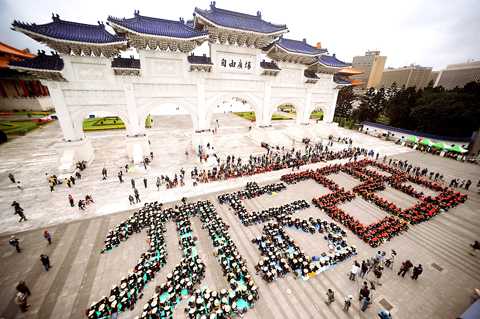More than 1,000 people took part in a sit-in rally on Liberty Square yesterday to commemorate the 62nd anniversary of the 228 Incident. The group formed the Chinese characters “wuwang 228” (勿忘228) —“Do not forget 228” — to remind the public not to forget the tragedy.
“Everyone in this country — not just those who were killed during the incident — is a victim of the 228 Incident, yet we only got to talk about the incident in public and tried to find the truth about it after martial law was lifted more than 20 years ago,” said Chen Yi-shen (陳儀深), chairman of the Taiwan Association of University Professors, the group that organized the rally.
“But 20 years after we began our search for the truth, did we find it? Did we find out who should take ultimate responsibility? Did we prosecute the culprit?” Chen asked the crowd.

PHOTO: FANG PIN-CHAO, TAIPEI TIMES
The 228 Incident refers to the uprising in 1947 against the Chinese Nationalist Party (KMT) regime and the brutal crackdown that left tens of thousands dead and led to a nearly four-decade-long rule under martial law.
“Chiang Kai-shek (蔣介石) was the one who made the decision to send troops to Taiwan based on all the information he had received, of course he should be held responsible,” Chen said. “We need reconciliation, but without confession and truth, there cannot be reconciliation.”
A participant in his 70s surnamed Liao, who witnessed the 228 Massacre, said the lessons of 228 have to be remembered.
“You were dead if you tried to challenge dictatorship through peaceful means,” he said.
Liao said that people were too naive and believed that they could talk and negotiate with Chen Yi (陳儀), the executive administrator at the time.
“Chen Yi promised reforms on one hand, but asked for more troops from Chiang on the other,” Liao said. “At the end, most of the people who negotiated with Chen Yi were murdered.”
“People should remember the lessons and do not get deceived again,” he said.
Yang Tzu-fu (楊梓富), who did not join the crowd in forming the Chinese characters, began his own sit-in at the square on Friday night. He said that the public should remember 228 for the courage that the people showed during the incident.
“Our ancestors were so brave in resisting the [KMT] regime at the time, but we have compromised. We're letting them down,” he said.
Taiwan Solidarity Union Chairman Huang Kun-huei (黃昆輝) told reporters that he felt proud and honored to participate in the sit-in and would continue to contribute to the search for the truth behind the 228 Incident.
“Activities like these promote social justice, human rights and peace,” he said, adding that people can forgive what the KMT has done but should never forget the “costly historical lesson.”
ADDITIONAL REPORTING BY CNA

Chinese spouse and influencer Guan Guan’s (關關) residency permit has been revoked for repeatedly posting pro-China videos that threaten national security, the National Immigration Agency confirmed today. Guan Guan has said many controversial statements in her videos posted to Douyin (抖音), including “the red flag will soon be painted all over Taiwan” and “Taiwan is an inseparable part of China,” and expressing hope for expedited reunification. The agency last year received multiple reports alleging that Guan Guan had advocated for armed reunification. After verifying the reports, the agency last month issued a notice requiring her to appear and explain her actions. Guan

The Kaohsiung Tourism Bureau audited six hotels in an effort to prevent price gouging ahead of Korean band BTS’ concert tour in the city scheduled for Nov. 19, 21 and 22 this year. The bureau on Friday said that the audits — conducted in response to allegations of unfair pricing posted on social media — found no wrongdoing. These establishments included the local branches of Chateau de Chine, Hotel Nikko, My Humble House, and Grand Hai Lai, it said, adding that the Consumer Protection Commission would have penalized price gougers had the accusations been substantiated. The bureau said the Tourism Development Act

GIVE AND TAKE: Blood demand continues to rise each year, while fewer young donors are available due to the nation’s falling birthrate, a doctor said Blood donors can redeem points earned from donations to obtain limited edition Formosan black bear travel mugs, the Kaohsiung Blood Center said yesterday, as it announced a goal of stocking 20,000 units of blood prior to the Lunar New Year. The last month of the lunar year is National Blood Donation Month, when local centers seek to stockpile blood for use during the Lunar New Year holiday. The blood demand in southern Taiwan — including Tainan and Kaohsiung, as well as Chiayi, Pingtung, Penghu and Taitung counties — is about 2,000 units per day, the center said. The donation campaign aims to boost

BACK TO WINTER: A strong continental cold air mass would move south on Tuesday next week, bringing colder temperatures to northern and central Taiwan A tropical depression east of the Philippines could soon be upgraded to be the first tropical storm of this year, the Central Weather Administration (CWA) said yesterday, adding that the next cold air mass is forecast to arrive on Monday next week. CWA forecaster Cheng Jie-ren (鄭傑仁) said the first tropical depression of this year is over waters east of the Philippines, about 1,867km southeast of Oluanpi (鵝鑾鼻), and could strengthen into Tropical Storm Nokaen by early today. The system is moving slowly from northwest to north, and is expected to remain east of the Philippines with little chance of affecting Taiwan,